不定式与动名词
动名词与不定式的用法与区别

动名词与不定式的用法与区别动名词(Gerund)和不定式(Infinitive)是英语中常见的两种非谓语动词形式。
它们在句子中可以起到多种不同的功能,但在使用上有着一些区别。
本文将详细探讨动名词与不定式的用法与区别。
一、动名词的用法动名词是将动词+ing形式构成的,可以作为主语、宾语、表语、状语等多种用途。
1. 作主语动名词可以作为句子的主语,通常表示一种行为或状态。
例:Swimming is good for health.(游泳有益于健康。
)2. 作宾语动名词可以作及物动词的宾语,表示被动或被动态。
例:She enjoys reading books.(她喜欢读书。
)3. 作表语动名词可以作表语,通常与连系动词be或感官动词连用,表示主语的行为或状态。
例:Her hobby is painting.(她的爱好是绘画。
)4. 作状语动名词可以作状语,表示行为发生的时间、原因、结果等。
例:He made money by selling paintings.(他通过卖画赚钱。
)二、不定式的用法不定式是动词原形,通常由to + 动词构成,可以用作名词、形容词或副词。
1. 作名词不定式可以作名词,作主语、表语、宾语等。
例:To learn a foreign language is important.(学一门外语很重要。
)2. 作形容词不定式可以作形容词,修饰名词或代词。
例:She has a lot of work to do.(她有很多工作要做。
)3. 作副词不定式可以作副词,修饰动词、形容词或副词。
例:He worked hard to pass the exam.(他努力学习以通过考试。
)三、动名词与不定式的区别虽然动名词和不定式都是非谓语动词形式,但它们在使用上有一些区别。
1. 主动与被动动名词通常表示主动意义,而不定式可以表示被动意义。
例:I enjoy swimming.(我喜欢游泳。
动名词与不定式的区别
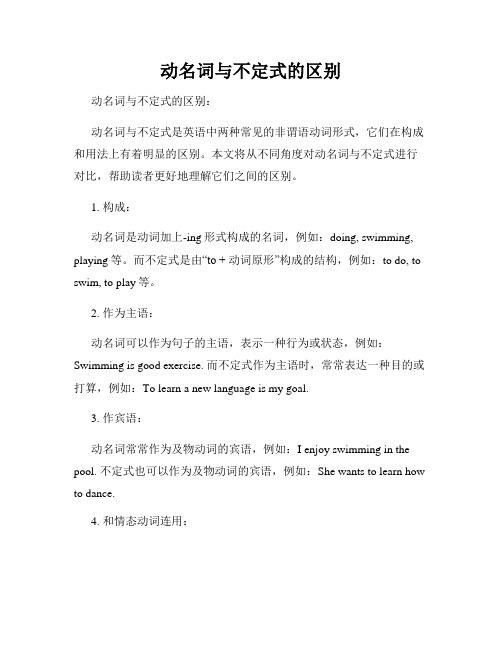
动名词与不定式的区别动名词与不定式的区别:动名词与不定式是英语中两种常见的非谓语动词形式,它们在构成和用法上有着明显的区别。
本文将从不同角度对动名词与不定式进行对比,帮助读者更好地理解它们之间的区别。
1. 构成:动名词是动词加上-ing形式构成的名词,例如:doing, swimming, playing等。
而不定式是由“to + 动词原形”构成的结构,例如:to do, to swim, to play等。
2. 作为主语:动名词可以作为句子的主语,表示一种行为或状态,例如:Swimming is good exercise. 而不定式作为主语时,常常表达一种目的或打算,例如:To learn a new language is my goal.3. 作宾语:动名词常常作为及物动词的宾语,例如:I enjoy swimming in the pool. 不定式也可以作为及物动词的宾语,例如:She wants to learn how to dance.4. 和情态动词连用:当动名词和情态动词连用时,情态动词后面必须跟动名词形式,例如:I can't stand smoking. 而不定式和情态动词连用时,情态动词后跟不定式的原形,例如:She must study hard to pass the exam.5. 表达目的:动名词常用来表达一个动作或状态的目的,例如:I went to the gym for swimming. 而不定式也可以表达目的,例如:She walked fast tocatch the bus.通过以上对比,我们可以清楚地看到动名词与不定式在用法上的区别。
在实际运用中,我们需要根据句子的语境和需要选择合适的形式,以确保句子表达准确清晰。
希望本文的对比能帮助读者更好地理解动名词与不定式之间的区别,提高英语写作和表达的能力。
动词不定式与动名词的区别及使用方法
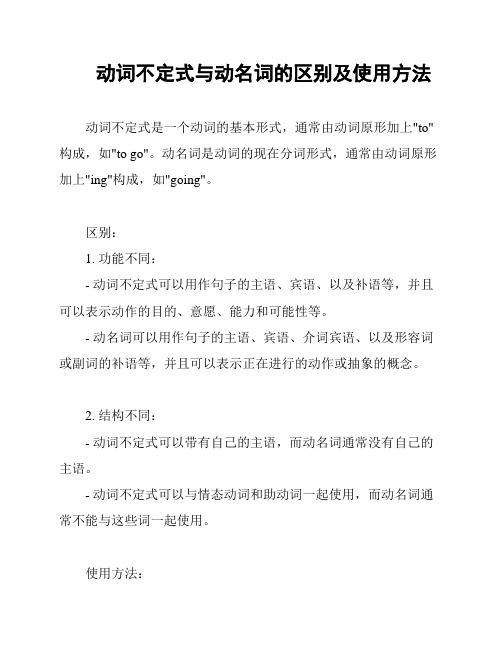
动词不定式与动名词的区别及使用方法动词不定式是一个动词的基本形式,通常由动词原形加上"to"构成,如"to go"。
动名词是动词的现在分词形式,通常由动词原形加上"ing"构成,如"going"。
区别:1. 功能不同:- 动词不定式可以用作句子的主语、宾语、以及补语等,并且可以表示动作的目的、意愿、能力和可能性等。
- 动名词可以用作句子的主语、宾语、介词宾语、以及形容词或副词的补语等,并且可以表示正在进行的动作或抽象的概念。
2. 结构不同:- 动词不定式可以带有自己的主语,而动名词通常没有自己的主语。
- 动词不定式可以与情态动词和助动词一起使用,而动名词通常不能与这些词一起使用。
使用方法:1. 动词不定式的使用:- 作主语:To travel is my dream.- 作宾语:I want to go on a vacation.- 表示目的:I study hard to pass the exam.- 表示意愿:I would like to visit my grandparents.- 表示能力和可能性:He is able to solve the problem.2. 动名词的使用:- 作主语:Swimming is a great exercise.- 作宾语:I enjoy reading books.- 作介词宾语:She is fond of playing the guitar.- 作补语:I am interested in learning new things.总结:动词不定式和动名词虽然在形式上有所区别,但在使用上都有自己独特的功能。
根据句子的需要和语境,我们可以选择合适的形式来表达我们想要表达的意思。
动名词与动词不定式的区别

动名词与动词不定式的区别动名词和动词不定式是英语中的两种非谓语动词形式,它们在用法和含义上有一些区别。
本文将介绍动名词和动词不定式的区别。
1. 形式- 动名词的形式是动词的现在分词形式,通常以-ing结尾。
例如:doing, going。
- 动词不定式的形式是动词的原形,通常以to加在动词前面。
例如:to do, to go。
2. 主语- 动名词可以作为句子的主语。
例如:Swimming is my favorite sport.(游泳是我最喜欢的运动。
)- 动词不定式不能直接作为句子的主语,但可以通过动名词的形式来表示。
例如:To swim is my favorite sport.(游泳是我最喜欢的运动。
)3. 动词后的宾语- 动名词可以直接跟在动词后作为宾语。
例如:I enjoy swimming.(我喜欢游泳。
)- 动词不定式通常需要用介词to来连接动词和宾语。
例如:I want to go swimming.(我想去游泳。
)4. 介词用法- 动名词可以直接跟在介词后使用。
例如:I'm interested in learning new languages.(我对研究新的语言感兴趣。
)- 动词不定式通常需要用介词to来引导介词短语。
例如:I'm looking forward to meeting you.(我期待着见到你。
)5. 用法和含义- 动名词表示一种持续性的动作或状态。
例如:He enjoys singing.(他喜欢唱歌。
)- 动词不定式表示一种将要发生的动作或状态。
例如:He wants to sing.(他想要唱歌。
)总结:动名词和动词不定式在形式、主语、宾语和介词用法上存在一些差异。
学会区分它们的用法和含义有助于提高英语表达的准确性和流利度。
动名词和不定式

动名词和不定式动名词和不定式是英语语法中两个常见的非谓语动词形式。
它们在使用方式、功能和结构上有一些共同点,但也存在一些区别。
本文将就动名词和不定式进行详细介绍和比较,并探讨它们在句子中的不同用法。
一、动名词动名词是用动词的-ing形式作为名词使用。
它可以在句子中担任主语、宾语、表语、介词宾语、复合宾语等要素。
下面将从不同的角度来说明动名词的用法。
1. 动名词作主语动名词作主语时,通常表示一种习惯、经验、喜好或普遍现象等。
例如:- Smoking is harmful to your health.(吸烟对健康有害。
)- Dancing gives her joy.(跳舞使她快乐。
)2. 动名词作宾语常见的动词后面可以接动名词作宾语,例如:- He enjoys swimming in the river.(他喜欢在河里游泳。
)- She avoids doing her homework.(她避免做她的功课。
)3. 动名词作表语动名词还可以作表语,表示主语的行为或状态。
例如:- Her favorite activity is hiking.(她最喜欢的活动是远足。
)- The key to success is working hard.(成功的关键是努力工作。
)4. 动名词作介词宾语某些动词后面接介词,再接动名词作宾语。
例如:- She is thinking about going abroad.(她正在考虑出国。
)- He apologized for not attending the meeting.(他为没有参加会议而道歉。
)5. 动名词作复合宾语当动词后面接宾语和动名词时,宾语常常是指一个动作、情感或想法,而动名词则起到具体说明或解释的作用。
例如:- I like playing basketball.(我喜欢打篮球。
)- They hate doing household chores.(他们讨厌做家务。
动词的不定式与动名词的区别

动词的不定式与动名词的区别动词的不定式(infinitive)和动名词(gerund)是英语中两种常见的非谓语动词形式。
尽管在形式上它们有一些相似之处,但在用法和含义上有明显的区别。
本文将详细介绍动词的不定式和动名词的区别,以便读者更好地理解和运用它们。
一、形式上的区别1. 动词的不定式通常由“to + 动词原形”构成,例如:to learn,to eat,to go等。
2. 动名词则是在动词原形后面直接加上-ing,例如:learning,eating,going等。
二、用法上的区别1. 主语的区别:a) 不定式作为主语:不定式一般用作主语时,表示一种抽象的行为、概念或目的。
例如:- To learn a new language is challenging.(学一门新语言很有挑战性。
)b) 动名词作为主语:动名词用作主语时,表示一种具体的、实际的行为或活动。
例如:- Reading helps expand your vocabulary.(阅读有助于扩大你的词汇量。
)2. 宾语的区别:a) 不定式作为宾语:不定式可以作为及物动词或不及物动词的宾语,常用于某些动词后,例如:want,hope,decide等。
例如: - She wants to learn Chinese.(她想学中文。
)b) 动名词作为宾语:动名词一般用作及物动词的宾语,常用于某些动词后,例如:enjoy,like,dislike等。
例如:- He enjoys swimming in the ocean.(他喜欢在海里游泳。
)3. 表语的区别:a) 不定式作为表语:不定式可以用作表语,通常用于表示完成、未来或可能性等。
例如:- His dream is to become a doctor.(他的梦想是成为一名医生。
)b) 动名词作为表语:动名词不常用作表语。
4. 定语的区别:a) 不定式作为定语:不定式可以用作修饰名词或代词的定语,常用于表示目的、原因或解释等。
什么是动名词和不定式

什么是动名词和不定式?动名词(Gerunds)和不定式(Infinitives)都是非谓语动词的形式,它们在句子中具有名词的功能,但在形式和用法上有一些区别。
1. 动名词(Gerunds):动名词是动词的现在分词形式(动词原形+ ing)。
它可以作为名词的主语、宾语、补语或介词的宾语。
-作主语:Swimming is my favorite sport.(动名词作主语)-作宾语:I enjoy reading books.(动名词作宾语)-作补语:Her hobby is dancing.(动名词作补语)-作介词的宾语:He is good at playing the guitar.(动名词作介词的宾语)动名词通常与动词一起使用,表示实际的动作或状态。
2. 不定式(Infinitives):不定式是由动词原形前加上"to"构成(例如:to go,to eat,to sleep)。
它可以作为名词、形容词和副词的补语。
-作名词:I like to swim.(不定式作名词)-作形容词:This is a good book to read.(不定式作形容词)-作副词:He runs to keep fit.(不定式作副词)不定式通常与动词一起使用,表示目的、原因、结果、条件等语义关系。
在用法上,动名词和不定式有一些区别:-动名词强调动作的实际发生,常用于表示喜好、爱好、经验等;-不定式强调动作的目的、原因、结果等,常用于表示意愿、计划、建议等。
此外,不定式还有时态和语态的变化,如一般不定式、完成不定式、进行不定式、被动不定式等。
例如:- I like swimming.(动名词作主语)- I want to swim.(不定式作宾语)- He enjoys playing basketball.(动名词作宾语)- He decided to play basketball.(不定式作宾语)在学习和运用动名词和不定式时,我们需要了解它们的用法、搭配和语义差异,并根据上下文准确选择合适的形式。
不定式与动名词的区别

不定式与动名词的区别不定式和动名词是英语语法中常用的两种名词形式,它们在使用和功能上有一些区别。
本文将详细介绍不定式和动名词的区别。
一、定义不定式是动词的一种非谓语形式,由“to + 原型动词”构成,可以用作名词、形容词或副词。
例如:“to eat”、“to sleep”。
动名词是动词的一种非谓语形式,以-ing 结尾,可以用作名词。
例如:“eating”、“running”。
二、用途1. 不定式的用途(1)作主语:To travel broadens the mind.(旅行可以开拓眼界。
)(2)作宾语:She likes to swim.(她喜欢游泳。
)(3)作宾补:He wants to be a doctor.(他想成为医生。
)(4)作定语:This is a place to relax.(这是个休闲的地方。
)(5)作状语:He came here to talk with you.(他来这里和你谈话。
)2. 动名词的用途(1)作主语:Studying English is important.(学习英语很重要。
)(2)作宾语:I enjoy reading books.(我喜欢读书。
)(3)作宾补:I consider it worth trying.(我认为值得一试。
)(4)作定语:She's afraid of flying.(她害怕坐飞机。
)(5)作状语:He made money by selling paintings.(他靠卖画赚钱。
)三、区别与辨析1. 动作性与名词性不定式具有动词的动作性质,可以表示动作的进行或完成;动名词则具有名词的性质,可以作主语、宾语等。
比较:(1)I want to go to the park.(不定式作宾语,表示目的)(2)Going to the park is my favorite activity.(动名词作主语,表示活动本身)2. 是否能够接宾语不定式可以接宾语,通常在“动词+宾语+不定式”结构中用于表示一个完整的动作;动名词不能直接接宾语,需要借助介词来连接。
不定式与动名词

【语法讲解】不定式(infinitives) 和动名词(gerund)一,不定式:动词不定式的形式是"to +动词原形",第一,带to的不定式结构1.我们学过的能直接跟带to的不定式结构的动词主要有: want, ask, tell, hope, learn, try, decide,forget, remember, like ,love, stop, go, come等。
2.动词不定式的否定形式是在不定式前直接加not,即not to do sth.。
如:Jim told me not to wake up Kate.吉姆告诉我别叫醒凯特。
第二,不带to的不定式结构。
以下几种情况使用不带to的动词不定式:1.在固定词组had better之后。
注意:had better的否定形式是had better not do sth.。
如:It's cold outside. You'd better not go out.外面很冷,你最好不要出去。
2.在let, make, have, see, feel, watch, hear等感官或使役动词后,要跟不带to的动词不定式作宾语补足语。
如:I didn't see you come in.我没看见你进来。
第三,动词不定式作主语不定式结构作主语时,现代英语倾向于采用it作形式主语, 把真正的主语不定式置于句后,常用于下列句式中.如:1. It takes sb + some time +to doHow long did it take you to finish the work2. It+be+形容词+for sb +to doIt is difficult for us to finish writing the composition in ten minutes.3. It+be+形容词+of sb +to doIt is stupid of you to write down everything the teacher says.二,不定式和动名词作主语的区别1.动名词作主语通常表示抽象动作;而不定式作主语表示具体动作。
动名词和不定式的区分和考点总结

三、to是介词的高频短语
1.bebecome used/accustomed to 习惯于 2.be addicted to 沉溺于;对…上瘾 3.devote oneself to 致力于 4. turn to doing 开始 5.be attached to 附属于;喜欢;依恋 6.get down to 认真做.... 7.lead to 导致 8. look forward to 9.be equal to 胜任 10. the key to做...的关键 11. owing/thanks to...由于 12. make contributions to... 13. pay attention to 14. stick to 15. refer to 查阅;提及
五、动名词复合结构 作主语时,须用名词所有格或形容词
性物主代词;作宾语时,也可用普通格 或人称代词宾格。
Playing basketball is my hobby.
Tom’s (His) coming made us glad.
She didn’t mind Jack/ Jack’s (him/ his) coming here.
六、主动结构表被动意义
1.sth need/want/require doing to be done
例:The house needs repairing/to be repaired.
2. Sth is worth doing. sth is worthy to be done
例: This place is worth visiting. 3. Being understood is important.
stop doing sth. 4. regret to do sth.
动词不定式与动名词的区别
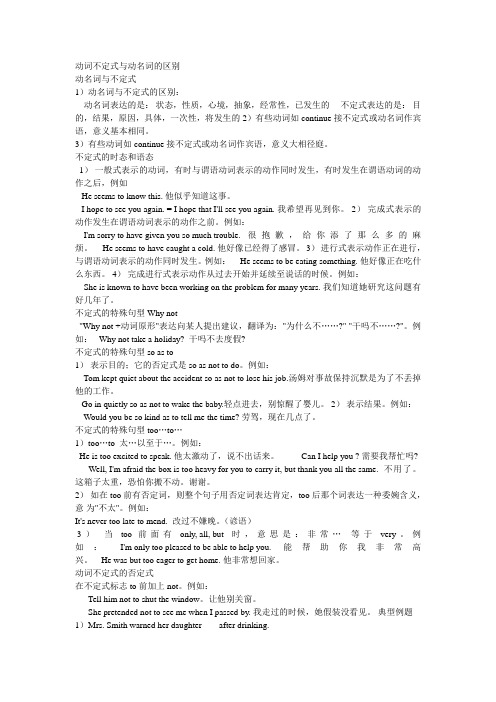
动词不定式与动名词的区别动名词与不定式1)动名词与不定式的区别:动名词表达的是:状态,性质,心境,抽象,经常性,已发生的不定式表达的是:目的,结果,原因,具体,一次性,将发生的 2)有些动词如continue接不定式或动名词作宾语,意义基本相同。
3)有些动词如continue接不定式或动名词作宾语,意义大相径庭。
不定式的时态和语态1)一般式表示的动词,有时与谓语动词表示的动作同时发生,有时发生在谓语动词的动作之后,例如He seems to know this. 他似乎知道这事。
I hope to see you again. = I hope that I'll see you again. 我希望再见到你。
2)完成式表示的动作发生在谓语动词表示的动作之前。
例如:I'm sorry to have given you so much trouble. 很抱歉,给你添了那么多的麻烦。
He seems to have caught a cold. 他好像已经得了感冒。
3)进行式表示动作正在进行,与谓语动词表示的动作同时发生。
例如: He seems to be eating something. 他好像正在吃什么东西。
4)完成进行式表示动作从过去开始并延续至说话的时候。
例如:She is known to have been working on the problem for many years. 我们知道她研究这问题有好几年了。
不定式的特殊句型Why not"Why not +动词原形"表达向某人提出建议,翻译为:"为什么不……?" "干吗不……?"。
例如: Why not take a holiday? 干吗不去度假?不定式的特殊句型so as to1)表示目的;它的否定式是so as not to do。
动名词和不定式的区别
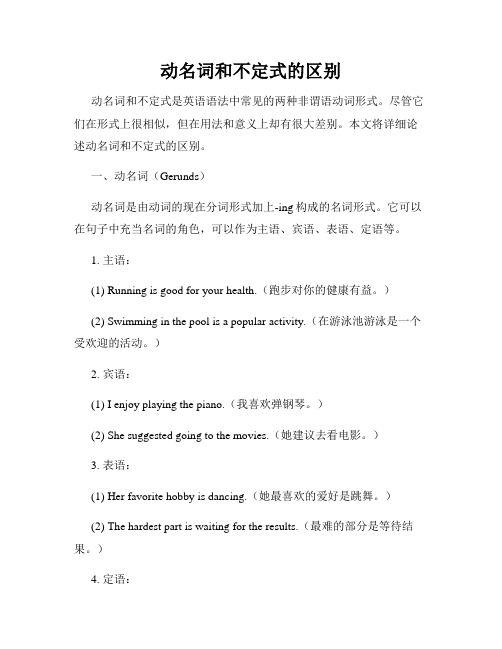
动名词和不定式的区别动名词和不定式是英语语法中常见的两种非谓语动词形式。
尽管它们在形式上很相似,但在用法和意义上却有很大差别。
本文将详细论述动名词和不定式的区别。
一、动名词(Gerunds)动名词是由动词的现在分词形式加上-ing构成的名词形式。
它可以在句子中充当名词的角色,可以作为主语、宾语、表语、定语等。
1. 主语:(1) Running is good for your health.(跑步对你的健康有益。
)(2) Swimming in the pool is a popular activity.(在游泳池游泳是一个受欢迎的活动。
)2. 宾语:(1) I enjoy playing the piano.(我喜欢弹钢琴。
)(2) She suggested going to the movies.(她建议去看电影。
)3. 表语:(1) Her favorite hobby is dancing.(她最喜欢的爱好是跳舞。
)(2) The hardest part is waiting for the results.(最难的部分是等待结果。
)4. 定语:(1) I have a painting class every Tuesday.(我每周二有一节绘画课。
)(2) The running shoes are on sale.(跑鞋正在打折。
)二、不定式(Infinitives)不定式是由to加上动词原形构成的形式。
不定式可以在句子中充当动词、形容词或名词的角色,可以作为动词、定语、表语等。
1. 动词:(1) She wants to learn a new language.(她想学一门新语言。
)(2) They decided to go on a trip together.(他们决定一起去旅行。
)2. 定语:(1) I need a pen to write the report.(我需要一支笔来写报告。
动名词和不定式的区别与用法
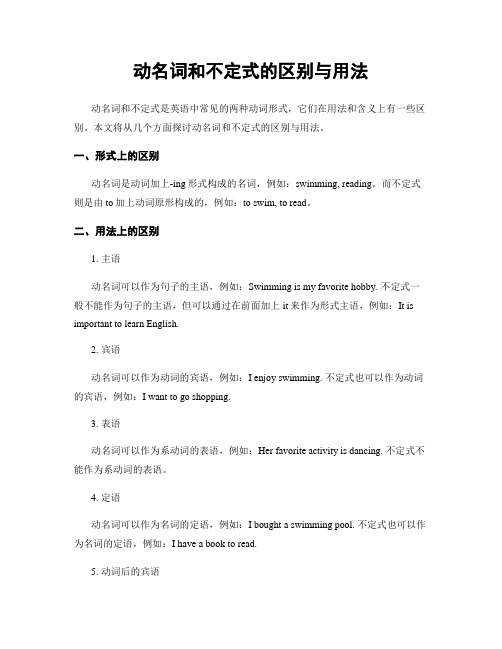
动名词和不定式的区别与用法动名词和不定式是英语中常见的两种动词形式,它们在用法和含义上有一些区别。
本文将从几个方面探讨动名词和不定式的区别与用法。
一、形式上的区别动名词是动词加上-ing形式构成的名词,例如:swimming, reading。
而不定式则是由to加上动词原形构成的,例如:to swim, to read。
二、用法上的区别1. 主语动名词可以作为句子的主语,例如:Swimming is my favorite hobby. 不定式一般不能作为句子的主语,但可以通过在前面加上it来作为形式主语,例如:It is important to learn English.2. 宾语动名词可以作为动词的宾语,例如:I enjoy swimming. 不定式也可以作为动词的宾语,例如:I want to go shopping.3. 表语动名词可以作为系动词的表语,例如:Her favorite activity is dancing. 不定式不能作为系动词的表语。
4. 定语动名词可以作为名词的定语,例如:I bought a swimming pool. 不定式也可以作为名词的定语,例如:I have a book to read.5. 动词后的宾语动名词可以直接跟动词后的宾语,例如:She enjoys swimming pools. 不定式一般需要用介词来连接动词后的宾语,例如:She wants to go to the swimming pool.6. 动词的完成形式动名词可以和完成时态连用,例如:I regret not studying harder. 不定式不能和完成时态连用,例如:I regret not to have studied harder.三、意义上的区别1. 动名词表示正在进行的动作或习惯性的动作,强调动作本身。
例如:I enjoy swimming. (我喜欢游泳)2. 不定式表示将来的动作或目的,强调动作的目的或意图。
常用句型动名词与不定式的区别

常用句型动名词与不定式的区别动名词和不定式作为英语语法中常用的词组形式,经常被用于表达特定的含义和语境。
本文将重点介绍动名词与不定式的区别,以帮助读者更好地理解和使用这两种句型。
一、定义和形式1. 动名词(Gerund)是动词的一种形式,以-ing结尾,并且在句中充当名词的角色。
动名词的形式为动词的原形 + -ing,例如:reading, swimming, studying等。
2. 不定式(Infinitive)是动词的一种形式,一般由“to + 动词原形”构成。
例如:to read, to swim, to study等。
二、句法用法1. 主语和宾语(1)动名词作为主语,常用于表达一般性的或已经完成的动作。
例如:Swimming is my favorite hobby.(游泳是我最喜欢的爱好。
)(2)不定式作为主语,常用于表达将来的或可能的动作。
例如:To travel around the world is my dream.(环游世界是我的梦想。
)(3)动名词作为宾语,常用于及物动词之后。
例如:I enjoy swimming in the ocean.(我喜欢在海洋中游泳。
)(4)不定式作为宾语,常用于及物动词之后,并带有to。
例如:She wants to go shopping this weekend.(她想在这个周末去购物。
)2. 补语(1)动名词作为补语,常用于及物动词之后。
例如:I find it interesting watching movies.(我发现看电影很有趣。
)(2)不定式作为补语,常用于及物动词之后,并带有to。
例如:She considers him to be a good friend.(她认为他是个好朋友。
)3. 定语和状语(1)动名词作为定语,修饰名词。
例如:I have a swimming lesson tomorrow.(我明天有一节游泳课。
初中英语知识点归纳动词不定式与动名词的区别
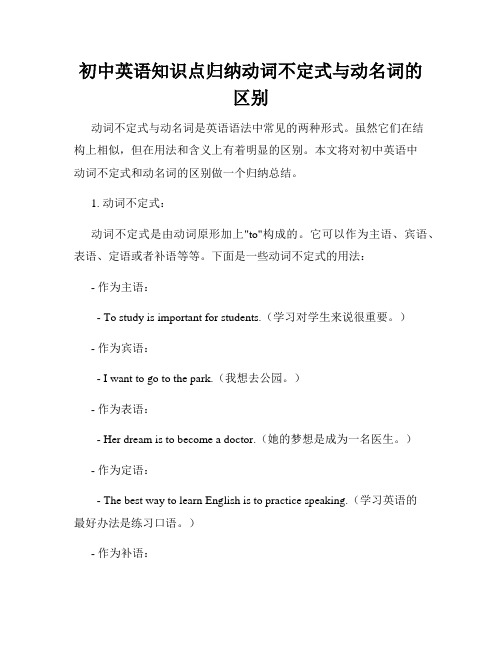
初中英语知识点归纳动词不定式与动名词的区别动词不定式与动名词是英语语法中常见的两种形式。
虽然它们在结构上相似,但在用法和含义上有着明显的区别。
本文将对初中英语中动词不定式和动名词的区别做一个归纳总结。
1. 动词不定式:动词不定式是由动词原形加上"to"构成的。
它可以作为主语、宾语、表语、定语或者补语等等。
下面是一些动词不定式的用法:- 作为主语:- To study is important for students.(学习对学生来说很重要。
)- 作为宾语:- I want to go to the park.(我想去公园。
)- 作为表语:- Her dream is to become a doctor.(她的梦想是成为一名医生。
)- 作为定语:- The best way to learn English is to practice speaking.(学习英语的最好办法是练习口语。
)- 作为补语:- He made her laugh.(他逗她笑了。
)2. 动名词:动名词是由动词加上"-ing"构成的名词形式,它可以作为主语、宾语、定语、表语或者补语等等。
下面是一些动名词的用法:- 作为主语:- Swimming is my favorite sport.(游泳是我最喜欢的运动。
)- 作为宾语:- I enjoy playing basketball.(我喜欢打篮球。
)- 作为定语:- The running water is very clear.(流动的水非常清澈。
)- 作为表语:- Her hobby is painting.(她的爱好是绘画。
)- 作为补语:- She kept him waiting for hours.(她让他等了几个小时。
)3. 区别总结:- 不定式通常表达一个动作的整体概念,而动名词通常表示正在进行或持续的动作。
- 不定式前面可以有情态动词或助动词,而动名词则不能。
不定式和动名词
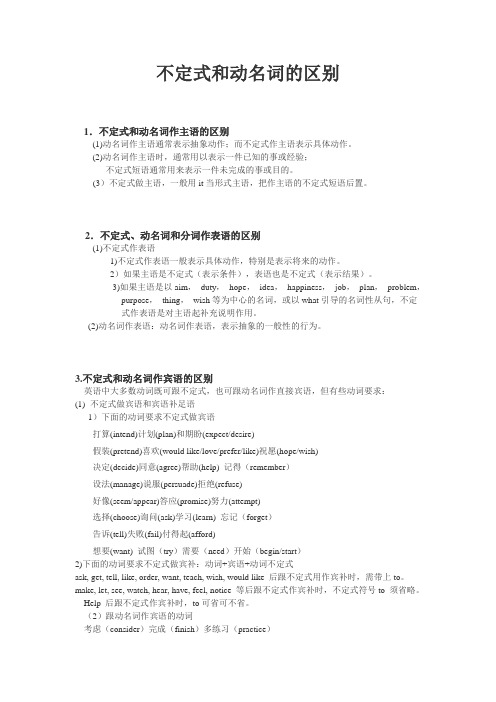
不定式和动名词的区别1.不定式和动名词作主语的区别(1)动名词作主语通常表示抽象动作;而不定式作主语表示具体动作。
(2)动名词作主语时,通常用以表示一件已知的事或经验;不定式短语通常用来表示一件未完成的事或目的。
(3)不定式做主语,一般用it当形式主语,把作主语的不定式短语后置。
2.不定式、动名词和分词作表语的区别(1)不定式作表语1)不定式作表语一般表示具体动作,特别是表示将来的动作。
2)如果主语是不定式(表示条件),表语也是不定式(表示结果)。
3)如果主语是以aim,duty,hope,idea,happiness,job,plan,problem,purpose,thing,wish等为中心的名词,或以what引导的名词性从句,不定式作表语是对主语起补充说明作用。
(2)动名词作表语:动名词作表语,表示抽象的一般性的行为。
3.不定式和动名词作宾语的区别英语中大多数动词既可跟不定式,也可跟动名词作直接宾语,但有些动词要求:(1)不定式做宾语和宾语补足语1)下面的动词要求不定式做宾语打算(intend)计划(plan)和期盼(expect/desire)假装(pretend)喜欢(would like/love/prefer/like)祝愿(hope/wish)决定(decide)同意(agree)帮助(help) 记得(remember)设法(manage)说服(persuade)拒绝(refuse)好像(seem/appear)答应(promise)努力(attempt)选择(choose)询问(ask)学习(learn) 忘记(forget)告诉(tell)失败(fail)付得起(afford)想要(want) 试图(try)需要(need)开始(begin/start)2)下面的动词要求不定式做宾补:动词+宾语+动词不定式ask, get, tell, like, order, want, teach, wish, would like 后跟不定式用作宾补时,需带上to。
不定式和动名词的区别
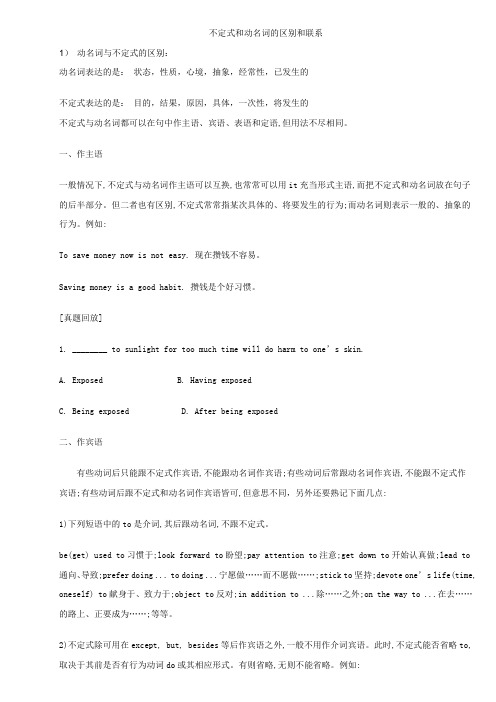
不定式和动名词的区别和联系1)动名词与不定式的区别:动名词表达的是:状态,性质,心境,抽象,经常性,已发生的不定式表达的是:目的,结果,原因,具体,一次性,将发生的不定式与动名词都可以在句中作主语、宾语、表语和定语,但用法不尽相同。
一、作主语一般情况下,不定式与动名词作主语可以互换,也常常可以用it充当形式主语,而把不定式和动名词放在句子的后半部分。
但二者也有区别,不定式常常指某次具体的、将要发生的行为;而动名词则表示一般的、抽象的行为。
例如:To save money now is not easy. 现在攒钱不容易。
Saving money is a good habit. 攒钱是个好习惯。
[真题回放]1. ________ to sunlight for too much time will do harm to one’s skin.A. ExposedB. Having exposedC. Being exposedD. After being exposed二、作宾语有些动词后只能跟不定式作宾语,不能跟动名词作宾语;有些动词后常跟动名词作宾语,不能跟不定式作宾语;有些动词后跟不定式和动名词作宾语皆可,但意思不同,另外还要熟记下面几点:1)下列短语中的to是介词,其后跟动名词,不跟不定式。
be(get) used to习惯于;look forward to盼望;pay attention to注意;get down to开始认真做;lead to通向、导致;prefer doing ... to doing ...宁愿做……而不愿做……;stick to坚持;devote one’s life(time, oneself) to献身于、致力于;object to反对;in addition to ...除……之外;on the way to ...在去……的路上、正要成为……;等等。
2)不定式除可用在except, but, besides等后作宾语之外,一般不用作介词宾语。
英语什么时候用不定式?什么时候用动名词?
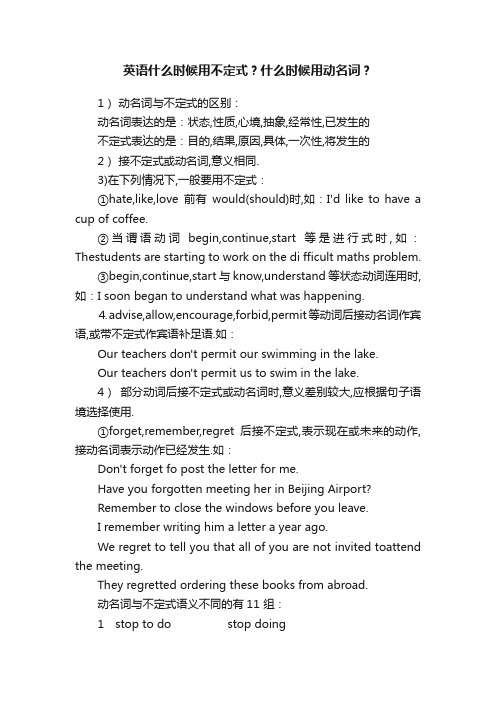
英语什么时候用不定式?什么时候用动名词?1)动名词与不定式的区别:动名词表达的是:状态,性质,心境,抽象,经常性,已发生的不定式表达的是:目的,结果,原因,具体,一次性,将发生的2)接不定式或动名词,意义相同.3)在下列情况下,一般要用不定式:①hate,like,love前有would(should)时,如:I'd like to have a cup of coffee.②当谓语动词begin,continue,start等是进行式时,如:Thestudents are starting to work on the di fficult maths problem.③begin,continue,start与know,understand等状态动词连用时,如:I soon began to understand what was happening.⒋advise,allow,encourage,forbid,permit等动词后接动名词作宾语,或带不定式作宾语补足语.如:Our teachers don't permit our swimming in the lake.Our teachers don't permit us to swim in the lake.4)部分动词后接不定式或动名词时,意义差别较大,应根据句子语境选择使用.①forget,remember,regret后接不定式,表示现在或未来的动作,接动名词表示动作已经发生.如:Don't forget fo post the letter for me.Have you forgotten meeting her in Beijing Airport?Remember to close the windows before you leave.I remember writing him a letter a year ago.We regret to tell you that all of you are not invited toattend the meeting.They regretted ordering these books from abroad.动名词与不定式语义不同的有11 组:1 stop to do stop doing2 forget to do forget doing3 remember to do remember doing4 regret to do regret doing5 cease to do cease doing6 try to do try doing7 go on to do go on doing8 afraid to do afraid doing9 interested to do interested doing10 mean to do mean doing11 begin/ start to do begin/ start doing。
不定式与动名词的区别

动词不定式和动名词是英语非谓语动词的两个重要部分一、作主语1、不定式作主语:动词不定式可直接用作主语, 句子的谓语动词常用单数。
To get there by bike will take us half an hour.对于主语较长的不定式,可以用it作形式主语。
例如:It's our duty to take good care of the old。
How long did it take you to finish the workIt is difficult for us to finish writing the composition in a quarter of an hour。
It seemed impossible to save money. It's kind of you to help me with my English。
2、动名词作主语:动名词也可直接用作主语,或者用it 作形式主语。
例如:Learning without practice is no good. It's no good reading in dim light. It’s no use sitting here waiting. It's dangerous swimming in the sea in windy days. There is no saying what will happen next.3、动词不定式和动名词作主语的区别(1) 不定式作主语经常表示具体动作,或者表示将要进行的动作。
而动名词作主语经常表示抽象的一般性的动作。
例如:It's no good for you to eat so much fat. (有具体的人for you)It’s no good eating too much fat. (泛指)(2) 不定式的逻辑主语常用of,for 表示;动名词逻辑主语则常用物主代词、名词、代词表示。
- 1、下载文档前请自行甄别文档内容的完整性,平台不提供额外的编辑、内容补充、找答案等附加服务。
- 2、"仅部分预览"的文档,不可在线预览部分如存在完整性等问题,可反馈申请退款(可完整预览的文档不适用该条件!)。
- 3、如文档侵犯您的权益,请联系客服反馈,我们会尽快为您处理(人工客服工作时间:9:00-18:30)。
在like, love, hate后, 若表示习惯性行为、通常的动作多用 动名词; 若表示特定的、具体的或一次性的动 作时,多用不定式。
She loves working in the garden. She said she’d love to come sometime.
3. It’ll start raining / to rain in the afternoon. 下午将开始下雨。
It is important to protect our environment. It is no use arguing with him at all .
6. 在 there is no 后面只用动名词。 There is no knowing if he will come. There is no telling where he has gone.
3. Don’t forget t_o__ta_k_e_ (take) an umbrella with you. It’s going to rain.
4. —How long does it take your father
_to__d_r_iv_e_ (drive) to work every day? —About half an hour.
I. 用所给单词的适当形式填空。 1. Stop _ta_l_k_in__g (talk), boys and girls. Class is
beginning. 2. —Do you enjoy p__la_y_i_n_g (play) basketball?
—Yes. I am a basketball fan.
to make the air clean. It is difficult
making the air clean. to meet you. It is nice meeting you here.
注: 当表语是 important, necessary, easy时后面只能用不定式。在 it is + adj /n. +for/of sb to do sth 句型只能用不定式 作真正的主语;而表语为no use, no good, a waste of time, worth时, 常用动 名词。
11. Granny often tells us _to__s_a_v_e (save) water in our daily life. 12. We can’t work out the physics problem. Can you tell me how _t_o_d_o_ (do) it? 13. Teachers often tell us _n_o_t_t_o_s_w_i_m_ (not swim) in the river after school. 14. May I have a rest? I have already finished w__r_it_in_g_ (write) the report. 15. If you see that cartoon film, it will make you l_a_u_g_h_ (laugh).
Mike continued writing / to write while he was in hospital. 迈克住院时继续写作。 She started to learn / learning French when she was in Paris. 在巴黎时她开始学习法语。
在某些动词后如 begin, start, prefer, learn, continue 既可以跟动名词也可 以跟动词不定式,意义上基本无差别。
to+v.和v.-ing作宾语时的用法比较
1. We’d like to thank you.
You must learn to look after yourself.
Tom refused to accept the book.
一些动词(would like, plan, hope, want, agree, decide, prepare等) 后跟动词作宾 语时,须用不定式。
8. I want _to__w_i_n_ (win). I like _w_i_n_n_in_g_ (win). 9. I’ll try _to__k_n_o_w_ (record) the programme. 10. Is that the weather report? I need
t_o__re_c_o_r_d_ (know) if it’s going to rain.
2. I enjoy showing visitors around. My sister enjoys listening to music. Keep studying. Jack keeps reading English every day. I hate losing. 常见的动词有enjoy, mind, finish, keep, practise, suggest等,须用动名词。
We should try to do something new or different. 我们应该尝试新的或不同的事情。
有些动词后如: forget, remember, stop, try, mean, go on, regret 既可 用动名词又可用不定式,但含义大不 相同。
5. 当 it 作形式主语时,真正的主语可 以是 doing 或 to do。
5. —What do you usually do at weekends?
—I often practises_p_e_a_k_i_n_g (speak) English.
6. When I came in, I saw him t_a_lk__in_g_ (talk) to Ms Li.
7. He remembers _g_e_tt_i_n_g_ (get) his first job in radio.
4. Remember to look out for the red light. 记住要注意看红色信号灯。
I remember listening to the song. 我记得我听过这首歌。
Stop talking! 停止说话! I stop to have a rest for a moment. 我停下来休息一会儿。
